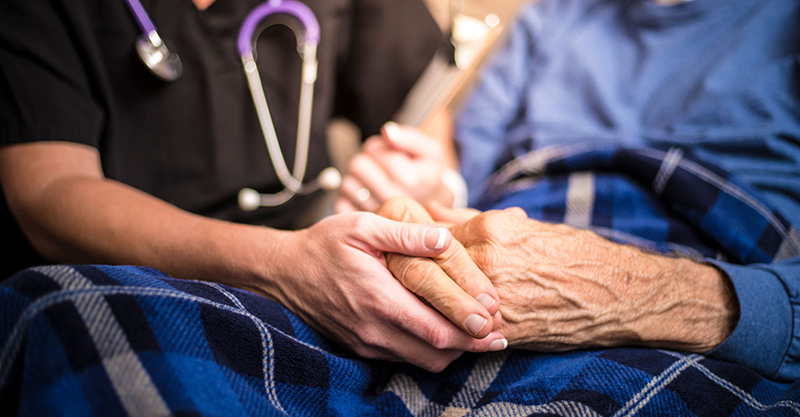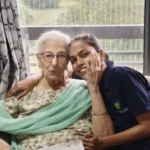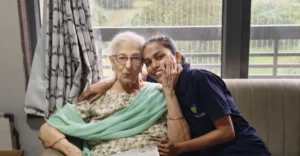When caring for your loved ones with dementia, anger and aggression can be challenging while caretaking. Everybody deals with outbreaks of anger and aggression, but dementia exaggerates the anger issues, even for people who previously had none. Generally, as dementia and anger worsen, the more severe the condition becomes.
Aggression in Dementia: How to cope?
Dementia is a progressive neurological condition that goes through stages and worsens with time. Dementia affects individuals differently and often presents itself with aggression as a companion sticking with this condition. Aggressive symptoms in any dementia-impacted person may be physical or verbal in the forms of hitting, scratching, banging, pulling, throwing things or swearing, screaming, threatening, etc. In Dementia Care, it is essential to identify the root causes of aggressive behaviour and find coping mechanisms accordingly than ruling it as just one of the uncontrollable symptoms.
Reasons for Aggression
With any dementia-centric aggressive behaviour, there is more to what meets the eye. It is a given to look beyond what is visible. Identifying and understanding the reasons is the first step toward working on possible interventions. Under challenging circumstances like aggression, empathy and patience is the key for any primary caregiver or family.
- Needs not met or understood: Seniors affected with Dementia may get frustrated with their inability to convey their needs due to memory loss, language issues, disorientation, or any unexplainable pain. It may lead to screaming, swearing, or causing any physical damage.
- Putting efforts to meet their needs: Seniors affected with Dementia would shout because they want to go to the toilet, may undress when they feel hot or suffocated, or may bang the door for want of going out.
- Losing the power of control: It can be a feeling of mental or physical loss of power. The inability to communicate or the carer’s failure to understand leads to frustration. One may not want to watch television but go for a walk instead.
- Sensory triggers: Loud sounds, certain smells, textures, tastes, closed rooms, and likes can create sensory overload and lead to aggressive meltdowns.
- Contact with people: A sudden change in caretaker, unable to meet loved ones, or a stranger interacting can all lead to confusion and discomfort leading to aggression.
- Feeling worthless or being of no use: Making no sense of people and surrounding often leads to isolation turning into a self-evaluation of being not helpful to any. People stop asking for help in things they were once so good at doing. One starts feeling less valued, and the helplessness turns into anger.
- Body in pain or stress: When there is unexplainable pain in any part, and no one gets it, asking them to carry on the usual routine, the pain gets expressed in anger and leads to behaviour unacceptable socially like physical harm or swearing.
- Lack of sleep or gut issues: When sleep deprived at night, the day usually defies logic in anything. The head is heavy, the mood gets foul, and irritation hits the roof. A soiled diaper, urine leak, or constipation can create undesirable expressions. While this can happen to normal human beings, the severity heightens in dementia patients.
- Inherent aggressive nature: When family history suggests the patient has been aggressive even in the pre-dementia stage, one knows Dementia only makes it worse for them.
Aggression in Dementia – Coping Mechanisms
- Rule out any physical pain.
- Check the vitals for any fever, blood pressure, or sugar level fluctuations.
- Keep your emotions in check as a caretaker, and do not get upset or angry irrespective of the challenging situation.
- React as per stages of aggression. If at an early stage, it will be a good idea to shift focus or redirect, be it activity or place.
- Familiar connections are comforting, so interaction with someone known is recommended.
- One must not take away chores they are used to managing themselves because of an aggressive outburst. Enable them with the power to take charge of what they have been doing.
- Help them to talk to their loved ones through calls, video calls, or social media.
- Try and do things that the person likes, be it walking, painting, listening to music, watching tv, or playing games – having purposeful engagement. Do not push them for things they are not interested in at that juncture, like forcing them for a bath, etc.
- Wander around feelings of the person and not on things they damaged or people they hurt and ask to apologize.
- Keep them active in a meaningful way as an idyllic state of being can make their circumstances more challenging.
- Sometimes touch therapy of holding hands, a hug, or a gesture can help calm down the tormented soul. Patience and kindness help a lot in diffusing aggressive behaviour.
Tips for caregivers
- Lower the expectations. You need to remember we cannot expect them to perform what their mind and body are not incapable of doing. Any failure on their part will have them lash back at you.
- As a recipient of aggressive abuse, swearings, or violent actions, it is a human tendency to return with equal force or relay hurtful things. Here you need to take a step back, think, and calm yourself before you handle it.
- Remove things that can cause potential damage to people or facilities like sharp objects, glass materials, and flammable objects out from the vicinity of outburst.
- Stick to their routine as much as possible, be it meal-times, bath times, or leisure activities. A set pattern is calming.
- Give them options, be it food or how they want to spend their free time. A sense of control over own life helps to mellow down.
- Keep at it as a team. Ensure the primary caregiver keeps the family members or team members in the loop about all new developments, be it on the health or behavioural front. It helps to divide the work involved and maintain consistency in front of patients. It can potentially reduce the gap between different relationship dynamics.
- Record keeping and tracking information in writing are mandatory on the patients- medicines, likes-dislikes, aggression triggers, past illnesses, allergies, aggression triggers. Whether home or an Assisted Care provider, a smooth transition always helps in case of changes in caregiver or doctor visits.
Is there a cure for aggressive behaviour?
Aggression in Dementia often finds its roots in biological, psychological, and environmental factors. Several assessments exist to quantify the frequency and severity of aggressive behaviours. There are many antipsychotic medicines available, and non-pharmacological methods get followed as interventions in line of treatment. Medications need constant review depending upon the stage of Dementia and aggravated level of symptoms like poor judgments, lack of concentration, disorientation, lack of memory, etc. Be it care homes or homes, aggressive behaviour in dementia patients is rather prevalent. Efficacy is limited to the effects of medicines. While medications are often effective in reducing and controlling symptoms, it is non-pharmacological methods by the caregiver that helps in the long run to manage.
Dementia- Here to stay!
Dementia-induced aggression is a real issue, visible and audible. It may not always be lifestyle triggered, nor will taken away by lifestyle changes. This condition needs time and full-time care-medical, emotional, physical, and environmental. When you have a loved ageing dementia member in the family and circumstances make full-time care a struggle, there are professional nurses or well-equipped and sufficiently staffed professionally run care homes. All one need to remember is their behaviour is not who they are but a result of what they are going through. Prioritize the person who needs care and go ahead extending possible solutions.
If searching for one, you no need to look beyond PapayaCare, an assisted living facility in Gujarat(Ahmedabad and Surat). It has the expertise and knowledge in Personal Care Services and Dementia and Disability care. The team of caregivers, nursing staff, floor managers, and doctors on calls will assist in managing symptoms of this condition. At PapayaCare, the best of care is always assured and delivered to your loved one.
















